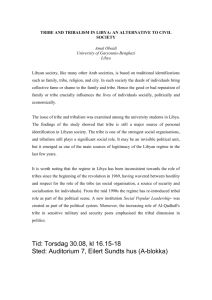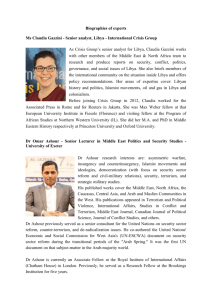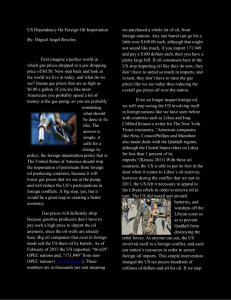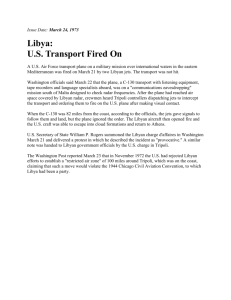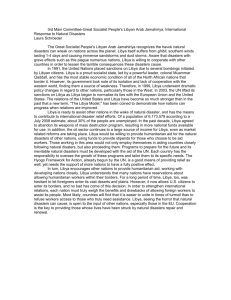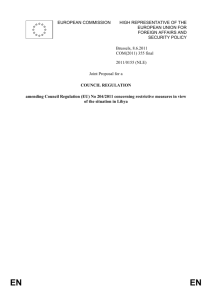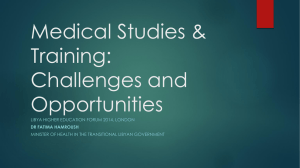What to Do About Libya: Intervention or Mediation?
advertisement
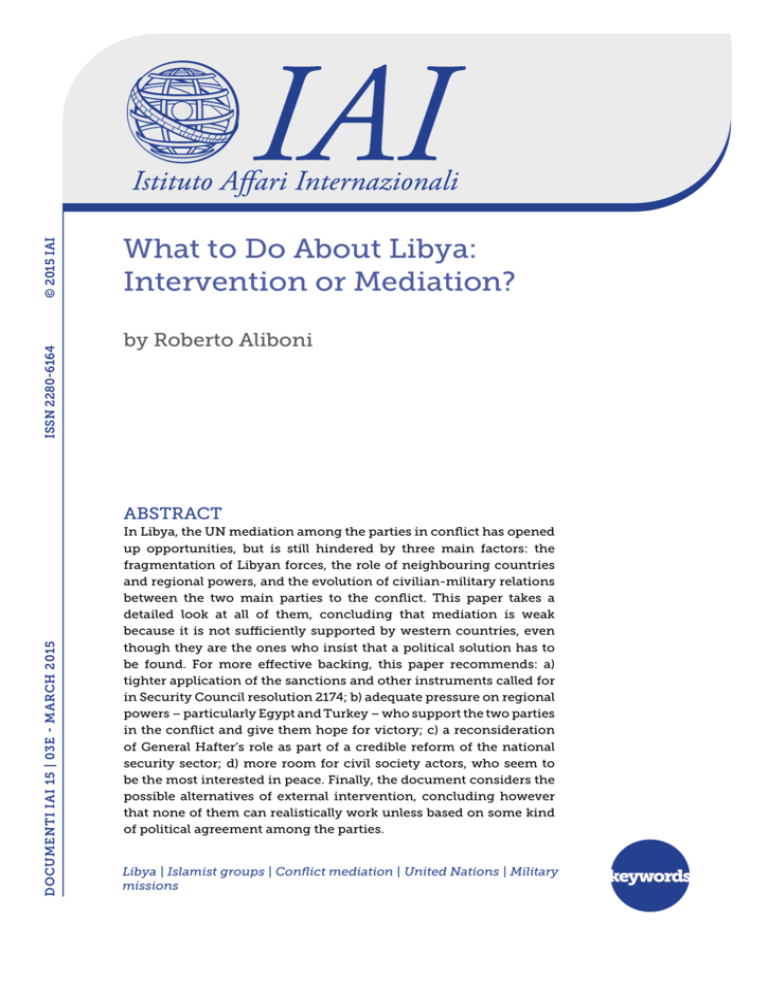
© 2015 IAI ISSN 2280-6164 What to Do About Libya: Intervention or Mediation? by Roberto Aliboni DOCUMENTI IAI 15 | 03E - March 2015 Abstract In Libya, the UN mediation among the parties in conflict has opened up opportunities, but is still hindered by three main factors: the fragmentation of Libyan forces, the role of neighbouring countries and regional powers, and the evolution of civilian-military relations between the two main parties to the conflict. This paper takes a detailed look at all of them, concluding that mediation is weak because it is not sufficiently supported by western countries, even though they are the ones who insist that a political solution has to be found. For more effective backing, this paper recommends: a) tighter application of the sanctions and other instruments called for in Security Council resolution 2174; b) adequate pressure on regional powers – particularly Egypt and Turkey – who support the two parties in the conflict and give them hope for victory; c) a reconsideration of General Hafter’s role as part of a credible reform of the national security sector; d) more room for civil society actors, who seem to be the most interested in peace. Finally, the document considers the possible alternatives of external intervention, concluding however that none of them can realistically work unless based on some kind of political agreement among the parties. Libya | Islamist groups | Conflict mediation | United Nations | Military missions keywords What to Do About Libya: Intervention or Mediation? © 2015 IAI What to Do About Libya: Intervention or Mediation? by Roberto Aliboni* ISSN 2280-6164 Introduction The international community responded to the outbreak of war in Libya by initiating a diplomatic mediation within the framework of UNSMIL (United Nations Support Mission in Libya) led by the special envoy of the Secretary General, Ambassador Bernardino Léon. The mediation is aimed at fostering the establishment of a government of national unity in the framework of a “cease-fire” agreement with a view to opening the way eventually to the intervention of UN peace-keeping forces. DOCUMENTI IAI 15 | 03E - March 2015 As of the beginning of March 2015, with the crisis becoming ever more complex and violent, how can this mediation be assessed and what are its prospects? The UN effort has run and is continuing to run into many obstacles, but there have also been some opportunities and successes. There are three main obstacles: the fragmentation of Libyan forces; the interference of neighboring countries and the leading powers in the region; the evolution of the civilian-military relationship within the two major parties to the conflict. 1. A conflict among fragmented forces The revolution of 17 February 2011 in Libya was triggered by a group of defectors from the regime, but was then conducted by a plethora of local forces, independent of one another who emerged spontaneously from the towns, the family and clientelistic networks, and the tribes. When the revolution broke out, the Muslim Brotherhood was the only organized political force. However, unlike in Egypt, the Libyan Muslim Brothers did not take over the leadership of the revolution. They entered the revolutionary front alongside groups that were politically secular and other, more radical Islamist groups, in a prominent but not leading position. * Roberto Aliboni is scientific advisor at the Istituto Affari Internazionali (IAI). Paper prepared for the Istituto Affari Internazionali (IAI), March 2015. Translated by Gabriele Tonne. . 2 What to Do About Libya: Intervention or Mediation? © 2015 IAI Consequently the conflict is not between Islamists and non-Islamists. The core of the conflict is between forces that we can call conservative (senior officials and military that rebelled against Gaddafi thus triggering the revolution) and revolutionary. The latter perceive the conservatives as descendants of the former regime and are brought together by the desire to exclude them altogether from the political scene rather than by any joint specific political project. This is why the Political Isolation Law of 14 May 2013, designed to prevent members of the defeated regime from having access to political life, was a major trigger of the conflict underway. ISSN 2280-6164 Because of their local and fragmented origin, the two opposing sides – conservatives and revolutionaries/Islamists – are vague and incoherent coalitions: the Libyan forces are more similar to local and patron-related centers of power1 than to structured national movements or parties. It is evident that this is not conducive to dialogue. However, while a basic problem for Libya, it does not rule out the possibility of a compromise. Right now two other obstacles are much more important: interference by regional actors and the dynamics of the security sector. 2. Regional interference and its impact From the very beginning of the revolution, the governments of the neighboring countries in the region provided support for the Libyan parties considered ideologically and politically closest to them. In particular, support was provided by Qatar and Turkey to the Muslim Brothers and other Islamist groups. Subsequently, dislike for the Muslim Brothers, personal and patronage ties, and finally developments in Egypt induced Saudi Arabia, the United Arab Emirates, Bahrein and Kuwait to side with the Libyan conservatives. DOCUMENTI IAI 15 | 03E - March 2015 In sparking the civil war, the two coalitions ipso facto merged into the vaster clash taking place in the region: the revolutionaries and Islamists (with the remains of the former Parliament, the General National Congress (GNC), and the Al-Hassi government) sided with Qatar and Turkey, the conservatives (with the House of Representatives (HoR) that resulted from the elections of 25 June 2014, and the AlThinni government) sided with Egypt and Saudi Arabia – in the framework of yet another of the “proxy wars” that continue to embody the conflict among regional powers. Support from regional powers – supply of weapons, bombings by their air forces, training – have not provided any decisive advantage to either of the coalitions. But the military and political leaders of both are induced to believe they can win and, 1 Frederic Wehrey, “Ending Libya’s Civil War. Reconciling Politics, Rebuilding Security”, in Carnegie Papers, No. 223 (September 2014), http://carnegieendowment.org/publications/?fa=56741; Frederic Wehrey and Wolfram Lacher, “Libya’s Legitimacy Crisis. The Danger of Picking Sides in the Post-Qaddafi Chaos”, in Foreign Affairs Snapshots, 6 October 2014, http://fam.ag/1s6Xo2G. 3 What to Do About Libya: Intervention or Mediation? consequently, there is little or no propensity to work towards political reconciliation through international mediation. ISSN 2280-6164 © 2015 IAI At the international and regional levels, there are numerous initiatives and statements aimed at encouraging reconciliation and stabilization in Libya and – as regards the neighboring countries – preventing a spillover of the conflict. Besides the many UN and international initiatives, mention must be made of some regional ones, such as the “Political Working Group” and the “International Contact Group for Libya”, both established in the pan-African setting and as a result of the collaboration of the African Union with the Arab League. Countries like Egypt, Turkey and other parties participate in some of them, as if they were neutral in the conflict. No Western country has openly objected thus far to the interference and ambiguities of the regional powers in the international and regional diplomatic initiatives. Such diplomatic “hypocrisy” can be explained by the alliances that Western countries have with most of these regional powers: Turkey is a member of NATO, Saudi Arabia and the other conservative Arab countries have long been allies of the West and, more importantly, are now members of the anti-ISIS coalition. Nevertheless interference by “neighbors” is a real threat to the integrity and stability of Libya and a severe obstacle to the mediation fostered by UNSMIL (which is the official policy of the Western countries). A more consistent stance by the Western countries is necessary. DOCUMENTI IAI 15 | 03E - March 2015 One thing that makes it difficult for Western positions to be fully consistent with the UNSMIL mediation is the fact that ISIS has landed in Libya with effects that are not easy to predict but must certainly not be underestimated. Indeed, this development encourages Western countries to strengthen ties with the countries in the anti-ISIS coalition, thus making it difficult to ask them to keep out of Libya. Furthermore, most of the countries of the region that belong to the anti-ISIS coalition are also the ones that support the conservatives. Therefore, if the anti-ISIS coalition were to expand to include Libya, this would encourage the Western countries to tilt towards or side with the Libyan conservatives and – as the latter are doing – lump all Islamist groups together – from ISIS to Ansar al-Sharia to the Libyan Muslim Brothers. This would weaken Western neutrality within the framework of the UNSMIL dialogue and make them lose sight of the fact that one of the main conditions for resolving the Libyan conflict is that the moderate Islamist forces must be a part of the final solution. 3. Civilian-military relationships in the Tobruk coalition … Alongside the impact of regional and international dynamics, the other significant development in the Libyan crisis concerns the relationship between the military, the political forces and civil society. 4 What to Do About Libya: Intervention or Mediation? © 2015 IAI The state of war and the power that the militias gained during the post-revolutionary transition have given the military no little sway over political leaders. Whatever the current balance between the two, the starting point for assessing the relationship between the civilian and military components of the two coalitions is the evolution and structuring of their respective security sectors. The wretched power-sharing policy by which the militias were put on the payroll and inserted in the ranks of the state, instead of integrating them in the framework of a renewal of the national armed forces, has led to a “hybrid”2 or two-tier system whereby a powerful informal sector, that is subject to state authority only on paper, competes with a weak formal sector, thus depriving the state of its monopoly over the use of force and undermining the institutions. ISSN 2280-6164 In this framework, both sides have more or less opportunistically favored the militias. However, while the revolutionaries have excluded the formal security system (the military of the past regime) from their armed wing, the conservatives have been more pragmatic and collusive. DOCUMENTI IAI 15 | 03E - March 2015 However, when former General Hafter, in alliance with some sectors of the national armed forces, appeared on the scene in February 2014 with an anti-Islamist agenda and a narrative that equated Islamism with terrorism, and launched “Operation Dignity” in May, even the conservatives perceived this to be a threat to the nascent democratic institutions. Nevertheless, the harsh political contrast in 20122013 and the Political Isolation law had already generated strong hostility in the conversatives towards the Muslim Brothers and the other Islamists that was in no way any less intense than towards Hafter. Later, the rejection of the results of the 25 June elections and the start of hostilities by the revolutionary-Islamist camp induced the conservatives to shift strongly towards a position that was politically and ideologically close to Hafter and their common regional patrons (Egypt, Saudi Arabia, the Emirates) and, like Hafter, hostile to the Muslim Brothers. This led the conservatives to adopt a policy promoting the national armed forces. It should be added that it was adopted not only for the political reasons mentioned above, but also to upset the military balance that at the beginning of the war seemed to be in favor of the revolutionaries and the Islamists. Today there are doubts that this policy has achieved the goal that the HoR and Al-Thinni presumably aimed at, namely a strengthening of the military within an appropriate institutional relationship between armed forces and the state. Between the end of 2014 and the beginning of 2015, the controversial General Hafter, together with 108 officers, were formally brought back into service.3 In 2 Wolfram Lacher and Peter Cole, “Politics by Other Means. Conflicting Interests in Libya’s Security Sector”, in Small Arms Survey Working Papers, No. 20 (October 2014), http://www.smallarmssurvey. org/about-us/highlights/highlights-2014/highlight-sana-wp20.html; Frederic Wehrey, “Ending Libya’s Civil War”, cit., p. 6 and ss. 3 “Libya recalls former general Haftar for army duty”, in Reuters, 19 January 2015, http://reut. rs/1Eigt5r. According to other sources the officers are 129: Nizar Sarieldin, “The Battle for 5 © 2015 IAI mid-February, according to some tweets by blogger Mohammed Eljahr4 (usually well informed), the HoR was preparing to put Hafter in charge of the armed forces, following the suggestion by Mahmoud Jibril (one of the foremost conservative leaders): “Haftar must be named General Commander of armed forces (a post lower than Commander in Chief – the speaker of the Chamber – & higher than Chief of Staff).” At the end of February the spokesperson of the HoR announced that the Speaker, Aguila Saleh (who is also head of the armed forces), decided to officially propose the appointment.5 The appointment was brought into effect at the beginning of March.6 ISSN 2280-6164 What to Do About Libya: Intervention or Mediation? The truth of the matter is that no real reform of the armed forces has taken place: Hafter, the officers and the leaders of the militia have all firmly held on to their share of power. No chain of command has been set up within the institutional framework of the state, the divisions remain, and Hafter has probably expanded his role, so much so that he tried to keep Al-Thinni from visiting the Benghazi troops on 1st February 2015 because his authorization7 had not been sought (probably to bear pressure on a HoR not totally convinced of his appointment as head of the armed forces). It is evident that there is also a strong thermidorian tendency in Libya – similar to what is happening to various other Arab states.8 It is equally evident that the conservative camp is divided over this, and that Al-Thinni failed in his attempt to manage the relationship between civilians and military while rousing the forces required for victory over the opposite camp. DOCUMENTI IAI 15 | 03E - March 2015 Today more than ever, a Hafter not duly integrated into the institutional framework appears to be a severe hindrance to the negotiations and a peaceful settlement. His agenda of fighting against Islamism and indiscriminately lumping the Muslim Brothers together with local as well as trans-regional jihadists – a view shared by the armed forces and their new Army Chief of Staff, Abdelrazzak Nadhouri9 Benghazi”, in SWP Comments, 8 February 2015, p. 6, http://www.swp-berlin.org/en/publications/ swp-comments-en/swp-aktuelle-details/article/libya_stabilization_by_military_means.html. See also Mary Atkinson, “Libya’s ‘renegade general’ welcomed back into army fold”, in Middle East Eye, 25 November 2014, http://www.middleeasteye.net/node/8994. 4 11 February 2015: https://twitter.com/Eljarh/status/565765501956411392; https://twitter.com/ Eljarh/status/565769191169736704; https://twitter.com/Eljarh/status/565765755451736065. 5 Ayman Al-Warfalli, “Libyan parliament proposes Haftar, a divisive figure, as head of army”, in Reuters, 25 February 2015, http://reut.rs/1JLGiRY. 6 “Libya’s HoR names Haftar as ‘army chief’”, in Middle East Eye, 2 March 2015, http://www. middleeasteye.net/node/34495. 7 Ayman Al-Warfalli and Feras Bosalum, “Libyan troops try to block PM visit, may signal rift within government”, in Reuters, 2 February 2015, http://reut.rs/1tXRMdS. 8 Robert Springborg, “The resurgence of Arab militaries”, in The Monkey Cage, 5 December 2014, http://wpo.st/oI660; Yezid Sayigh, “Militaries, civilians and the crisis of the Arab State, in The Monkey Cage, 8 December 2014, hhttp://wpo.st/FK660. 9 Youssef Aït Akdim et Joan Tilouine, “Libye: Abderrazak Nadhouri, sabre au clair contre les jihadistes”, in Jeune Afrique, 7 novembre 2014, http://www.jeuneafrique.com/Article/JA28072808p062-063.xml0. 6 What to Do About Libya: Intervention or Mediation? (Hafter’s comrade-in-arms in the revolution) – was already a main factor in the exacerbation of the political struggle during the first six months of 2014 and is now one of the biggest obstacles to rapprochement between the two warring camps and to the UNSMIL mediation. ISSN 2280-6164 © 2015 IAI There are certainly affinities between the Muslim Brothers and the Ansar al-Sharia of Libya, of which Omar Al-Hassi sung the praises in an unforgettable interview with The Times in November 2014, in which he described the Ansar al-Sharia as a “simple, beautiful and amiable idea”.10 But it is equally self-evident that a political solution presupposes that, on the one hand, the conservatives need to leave room for those Islamists that set themselves apart from jihadism and terrorism, and on the other hand, the revolutionaries and Islamists need to leave room, in turn, for the officers and military rank and file of the past regime who sever or have already severed their ties with it by fighting in the revolution of 17 February. Even though Hafter may not be the coup leader he is purported to be by “Dawn”, his extreme agenda, his agitated personal history and the all-too-close relationships he has with the Gulf countries and Egypt make him a threat for the peace negotiations and reconciliation. The Minister of the Interior, Omar Al-Zinki was right in saying on 9 February (probably also in view of the discussion under way about his appointment) “Haftar should be isolated before he causes the isolation of the whole Tobruk block.”11 4. … and in the coalition of “Libyan Dawn” DOCUMENTI IAI 15 | 03E - March 2015 The war has also led to developments in civilian-military relationships within the revolutionary-Islamist coalition, even though more with regard to relationships between the military and civil society rather than institutions and government. Unexpectedly, by involving civil society, the dialogue promoted by UNSMIL has highlighted significant dissent in the town of Misrata, taken to be the heart and custodian of the revolution of 17 February. Indeed, in early 2015, while the military leadership, fully supported by the political leadership based in Tripoli, was heightening the intensity of the clashes by attacking the Ras Lanuf and El Sidr terminals, the delegates of the Municipal Council of Misrata attended the dialogue facilitation meeting organized by the UNSMIL. They showed a deep and concrete interest in the dialogue, with both a view towards national reconciliation and out of concern for the spread of extremism and terrorism. They then endorsed the rehabilitation of the town of Tawergha (on Qadhafi’s side at the time of the revolution and punished by Misrata by sending 10 Quoted by Bel Trew, “Tripoli leader rejects negotiations with Libyan authorities”, in The Times, 18 November 2014, http://t.co/BZfPOAp6kd. 11 Quoted by Jason Pack, “Talks to Pay Symbolic Visit to Ghadames as Misratan Option Fails”, in Libya-Analysis.com, 9 February 2015, http://www.libya-analysis.com/talks-to-pay-symbolic-visitto-ghadames-as-misratan-option-fails. 7 What to Do About Libya: Intervention or Mediation? © 2015 IAI all the inhabitants of the town into exile), accepting the return of its citizens and a number of support and readjustment measures – a gesture that certainly did not please the unyielding hard-liners of the coalition, but which bears witness to the crumbling of the extremism of the revolutionary camp as a consequence of a war with no way out. ISSN 2280-6164 Various recent observers12 are pointing out that the town is tired after four years of war. Misrata is an industrial town with an important business community who probably feel they are not represented by the revolutionary “hard-liners”. From this standpoint, given the Libyan societal context, the presence of Ahmed Maetiq’s sister13 at a session of the UNSMIL dialogue is quite significant. Ahmed Maetiq is a businessman from Misrata who, appointed to replace Ali Zeidan in a confused session in Parliament, accepted to step down when the Supreme Court declared his election invalid, thus proving himself to be a moderate. At the time, the Western press presented Maetiq as the candidate of the Islamists. In actual fact, at that confused session, the opposition in parliament broke down into two groups, one in favor of Maetiq and the other in favor of Al-Hassi14 (who was to become the head of the rival government in Tobruk after the outbreak of the civil war). In fact, Maetiq was more a representative of Misrata than of the Islamists. It is likely that behind the initiative of the Municipal Council of Misrata there are people like Maetiq who represent the desires of a civil society that is eager to find a settlement so that the town can get back on its feet economically. DOCUMENTI IAI 15 | 03E - March 2015 In conclusion, civilian-military relationships have evolved during the civil war, and have had a strong impact on it. Developments in the Tobruk coalition have led to a relationship in favor of the military, a strong alliance with the anti-Islamist powers of the region and an uncompromising approach toward the other coalition (construed as Islamist rather than revolutionary). In the other coalition, the military leaders and “hard-liners” of the revolution and of Islamism have the power and are no less uncompromising than the group in Tobruk. However behind them is a strong movement of civil society that is pushing, instead, for dialogue and offers new opportunities for peace. 12 Ulf Laessing, “Misrata feels economic pinch as Libyan infighting spreads”, in Reuters, 29 January 2015, http://reut.rs/1zf8VyS; Frederic Wehrey, “Libya’s War-Weary Make Peace?”, in Foreign Affairs Letters From, 2 February 2015, http://fam.ag/1CrP1V4. 13 Ms Nehad Maetiq represents a Women Association in Libya; her name is on the list of participants in the Geneva UNSMIL dialogue session in January 2015. See UNSMIL press release, New Round of Libyan Political Dialogue at UN Office in Geneva to Commence Wednesday, 13 January 2015, http://t.co/q55D0bsSYb. 14 Nicola Pedde e Karim Mezran, “La vera battaglia in Libia non è tra laici e musulmani”, in Limes Online, 5 giugno 2014, http://temi.repubblica.it/limes/la-vera-battaglia-in-libia-non-e-tra-laici-emusulmani/62773. 8 What to Do About Libya: Intervention or Mediation? © 2015 IAI At this point, both camps appear to be “fractured” between “hard-liners” and “moderates.”15 This split within the two camps is further exacerbated by the fact that there is no sign of the military balance tipping in either direction. This is nerveracking for everyone and makes leaders fundamentally unsecure. On the whole, developments have posed obstacles to dialogue and mediation but they have also opened up major opportunities. 5. Third phase of the crisis: ISIS and Egypt appear on the scene ISSN 2280-6164 Like the other forces, the Libyan jihadists are “highly fragmented and hyperlocalized.”16 Up until October 2014, Ansar al-Sharia and the other Libyan jihadist groups operated on domestic turf without displaying any trans-regional or global characteristics. In October, a first jihadist group in Derna swore loyalty to ISIS with the support of Libyan fighters back from the Fertile Crescent and Yemenite and Saudi emissaries of ISIS. In November, Al-Baghdadi received their pledge of loyalty and later there was news of the establishment of three provinces of the Islamic State in Libya: Tripolitania, Barqa (Cyrenaica) and Fezzan. As of early 2015, the actions and presence of ISIS have spread with the same surprising rapidity as their previous propagation in Syria and Iraq. DOCUMENTI IAI 15 | 03E - March 2015 This rapidity is due to the fragmentation and political and military weakness of the countries in which ISIS decides to operate. This means we must not overestimate its strength, which lies in its clever and professional propaganda,17 in the ruthless and strategic use of terror in the framework of this propaganda, and in the weaknesses and divisions of their adversaries. Even though ISIS still remains a risk rather than a threat in Libya, its ruthlessness make it essential that the prospects and the damage it may produce in the meantime are not underrated (in all likelihood ISIS has already set up a successful racket in the area of illegal emigration for raising funds). The most urgent matter, however, is the political impact that the interference of ISIS causes on the Libyan crisis, both domestically and at the regional and international levels. As stated earlier, in the regional perspective, ISIS’ infiltration into Libya represents an expansion of its threat in the region and of the conflict that finds several Arab powers opposing ISIS and other regional powers. This extension of the threat was immediately perceived and was just as rapidly translated into the intervention of several Arab states into the territory of other Arab states: Jordan’s 15 Jason Pack, “Libya’s power blocs are fracturing”, in Al-Jazeera, 13 February 2015, http://aje.io/ edmr. 16 Frederic Wehrey, “Mosul in the Mediterranean? The Islamic State in Libya and U.S. Counterterrorism Dilemmas”, in Lawfare, 17 December 2014, http://www.lawfareblog. com/?p=41967. 17 Stathis N. Khalivas, “The logic of violence in the Islamic State’s war”, in The Monkey Cage, 7 July 2014, http://wpo.st/Gh660. 9 What to Do About Libya: Intervention or Mediation? ISSN 2280-6164 © 2015 IAI air force, supported by the air force of the Emirates, in Iraq within the framework of the anti-ISIS coalition; Kurdish support at the time of the siege of Kobane in Syria; and recently the air strike launched by the Egyptian air force on Derna as revenge for ISIS’ execution of 21 Egyptian Copts. In addition, the infiltration of ISIS in Libya aggravates the perception that it could be not only a risk but a real threat for other Southern European countries, above all Italy. On the one hand, propaganda like ISIS’ threat to conquer Rome has an impact on public opinion that governments cannot ignore; on the other hand, there are more concrete threats: for Italy, the fact that ISIS seems to be present in the illegal emigration racket, as mentioned earlier, is a rather disconcerting development; for France it is ISIS’ possible connections with jihadism and the trafficking that undermines stability in the Sahel region and Egypt. Indeed, Paris has already taken on precise responsibilities regarding its political and strategic interests with the “Barkhane Operation.”18 Thus, the “neighbors” of the Libyan crisis are expanding from regional to intercontinental as the powers of the Middle East and Northern Africa come together with those of Southern Europe, with the European Union in the background. DOCUMENTI IAI 15 | 03E - March 2015 Besides responding to domestic considerations, the unprecedented Egyptian decision to intervene openly in the Libyan crisis with air strikes and ground attacks was above all an attempt to involve Western powers in the armed conflict on the side of Tobruk’s conservatives. In fact, at the meeting of the UN Security Council on 18 February 2015, requested by Egypt itself and France, the Cairo government not only pleaded for intervention by the West, hence extending the commitment to the anti-ISIS coalition to include Libya, but it went much further by asking the West to support the Tobruk government and its related forces in an anti-Islamist and anti-terrorist effort. If this were to happen, it would put an end to any chance of dialogue and mediation. With this move, Egypt opened a third phase in the Libyan crisis, after the first phase characterized by the harsh political confrontation between the 2012 elections and those held in June 2014, and then the civil war from July 2014 to the present. In this phase, the explicit military intervention of an important regional patron has had the effect, on the one hand, of stepping up the military confrontation and strengthening the “hard-liners” who intend to continue until victory is achieved, and on the other hand, of openly and directly calling on the Western countries which, at this point, are obliged to be more transparent and accountable in their response. For the time being, they have rejected the advances of Al-Sisi and his regional allies, confirming the need for dialogue and mediation. However, it is precisely for this reason that they now need to support the mediation effort seriously and ensure that it is successful rather than limiting themselves to issuing declarations (and stop toying with interventionist rhetoric). 18 Rémi Carayol, “Hollande prépare le lancement de l’opération Barkhane à N’Djamena”, in Jeune Afrique, 19 juillet 2014, http://www.jeuneafrique.com/Article/ARTJAWEB20140719135338. 10 What to Do About Libya: Intervention or Mediation? ISSN 2280-6164 © 2015 IAI 6. How should the West respond? The flurry of debate prompted by the Egyptian airstrikes in mid February 2015 has focused on the alternative between intervention and mediation. In actual fact, mediation does not rule out the option of intervention, on the contrary it aims at making it legally and politically feasible while interventions not stemming from any mediation look less workable. In opting for dialogue, Western countries have displayed wisdom and realism: while a successful outcome of the dialogue would pave the way for peace-keeping interventions in the framework of international and UN legality, interventions made disregarding mediation could only aim at peaceenforcing. In the current state of affairs, moreover, it is not at all clear who should be the target of an intervention. Secondly, there do not appear to be the conditions for the Security Council to approve a peace-enforcing intervention. Therefore, an intervention would lie outside the bounds of international legality, as was the case with the Egyptian intervention, or would be of doubtful legality, as would be an intervention based on the responsibility to protect or on an international coalition of the willing. Finally, it could even disregard legality altogether, but would have dubious results and negative repercussions on international relations, for instance between Western countries and Russia. Against this general background, what response should be given to the rampant Libyan crisis and how should it be articulated? DOCUMENTI IAI 15 | 03E - March 2015 The Western world did well to respond to the Egyptian provocation by refusing to be dragged into the conflict and by confirming its support for mediation; however this response is under pressure from ISIS and if dialogue were unsuccessful, could prove difficult to sustain. Therefore the dialogue must not only be supported, it must be done with resolve and effectively. To that end, the following policies are recommended: 11 1) The sanctions envisaged by Resolution 2174 of the Security Council and the previous ones have to be enforced most urgently; in particular it is compelling that they be applied to the leaders and representatives who obstruct dialogue or who are involved in the atrocities that the UN and non governmental organizations have incontrovertibly documented recently.19 At the meeting on Libya of the EU Foreign Affairs Council on 9 February 2015, lists of Libyan representatives liable to sanctions were considered, but the list should have been enforced and not merely examined. 19 UN Human Rights Council, Report of the United Nations High Commissioner for Human Rights on the situation of human rights in Libya and on related technical support and capacity-building needs (A/HRC/28/51), 12 January 2015, http://undocs.org/A/HRC/28/51; Amnesty International (on western Libya), Libya: ‘Rule of the Gun’ amid mounting war crimes by rival militias, 30 October 2014, http://bit.ly/1sIVtN7; Amnesty International, Benghazi’s Descent into Chaos: Abductions, Summary Killings and Other Abuses, January 2015, http://www.amnestyusa.org/research/reports/benghazis-descent-into-chaos-abductions-summary-killings-and-other-abuses. DOCUMENTI IAI 15 | 03E - March 2015 ISSN 2280-6164 © 2015 IAI What to Do About Libya: Intervention or Mediation? 12 It is also important to strengthen the ban on arms trafficking by adopting, where necessary, control measures if not naval blockades (with the approval of the Security Council). At the meeting of the Security Council of 18 February 2015, Jordan submitted a draft resolution for prohibiting the transfer of weapons to non-state players and at the same time lightening it towards the recognized government of Tobruk. The draft was not approved. It is self-evident that this distinction between non-state players (revolutionaries and the “Dawn” Islamists) and internationally recognized players (the conservatives of Tobruk) – which the platform for UNSMIL dialogue rejected in November 2014 – is part of the narrative of the conservative Arab governments and certainly will not lead to a political settlement of the crisis. On the other hand, it is important to protect the resources from the disastrous competition to secure them that began in early 2015. It is hard to protect the assets held locally by the Central Bank. However the assets held in banks abroad, where payments are made for energy imports, could be frozen. It is true that this measure would have a disastrous impact on families and businesses as well and should be accompanied by actions to ensure humanitarian interventions in Libya. External interventions to protect the oil fields and export terminals would be more difficult because they are partly the object of clashes between the factions, of strikes by the Petroleum Defence Guards – who report to the Cyrenaican “federalists” faction – and more recently of attacks and sabotage by ISIS. Interventions for protecting the oil facilities and harbours could be authorized by the Security Council. This would nevertheless be very challenging from a military point of view. In the absence of a political understanding among the parties (for instance to prevent attacks by ISIS) they would have a strong polarizing effect and would work against mediation. 2) Western diplomacy must find a way to exert pressure on the regional powers so that they stop or limit their interference in the Libyan conflict; the pressure should not be limited to discouraging specific actions by the allied regional governments (transferring weapons and resources to the Libyans); it has to be embedded in the political solidarity that supports the anti-ISIS coalition: in other words the allies of the coalition should be induced to acknowledge and accept that the common anti-ISIS goals in Iraq and Syria be linked to other regional goals, such as the stabilization of Libya through negotiations. It must be recognized that setting such conditions will be difficult with the two countries – Turkey and Egypt. These are the main interfering countries since both have concrete national and domestic security interests (armed Islamist uprising in Egypt and the intertwining of the Kurdish issue and the conflict in Syria for Turkey). It is more difficult to influence Egypt, which has already taken the path of direct armed interference, than Turkey, whose support to its Libyan protégés is currently essentially political. Be that as it may, a diplomatic effort is needed to find some kind of political convergence and to at least limit the interference of these players. 3) Western and European governments need to bring pressure to bear on the AlThinni government so that its alliance with Hafter becomes less conditioning and can be brought into the framework of a serious plan to reform the armed forces; instead, while the goal of the Tobruk government to strengthen the formal security DOCUMENTI IAI 15 | 03E - March 2015 ISSN 2280-6164 © 2015 IAI What to Do About Libya: Intervention or Mediation? 13 sector is to be encouraged, the idea that this policy can be based on integrating Hafter and making him the supreme commander has to be discouraged because this – besides the thermidorian risks mentioned above – is bound to block any possibility of progress in the dialogue with the other coalition. Right or wrong, Hafter is particularly hated by revolutionaries and Islamists alike. Alison Pargeter reported that “As the head of the Misrata Shura Council, Suleiman Al-Faqih, asserted in March 2014, there was ‘no difference between Hafter and Qhadafi, and maybe Hafter is worse than Qadhafi.’”20 4) Western governments should enhance the contacts with civil society that the UNSMIL mediation has undertaken; civil society in Libya is an emerging political constituency that has the potential to dismantle the vested interests that make the factions continue the conflict; as rightly pointed out by Brian McQuinn, the dialogue has highlighted the fact that civil society “sidelines hardline elements by undermining the perception that they speak for a larger constituency than they actually control.”21 The importance of the municipal level of political representation has emerged because people are tired of war, and should therefore be encouraged, recognized and strengthened. While these efforts are desirable, a successful outcome of the dialogue is highly uncertain. Its minimal goals, the formation of a government of national unity accompanied by a cease-fire, seem to be remote even after the meetings organized by UNSMIL at the beginning of March in Morocco. The factions are divided and hesitant. It doesn’t come as a surprise that Tobruk is more hesitant than Tripoli and Misrata. Above and beyond the opposing, deeply-rooted interests, there are still other formidable obstacles: the narcissistic paranoia of the revolutionaries, the political blindness of the Libyan Muslim Brothers (rather like that of the Egyptian Brothers, but quite distant from the views of the Tunisian Brothers), the spread of extremism in the Islamist camp and the arrival on the Libyan scene of ISIS, the weakness of the Al-Thinni leadership and the dependence of the Tobruk government on its various supporters (from Hafter to Ibrahim Jadhran and his “federalists,” from Egypt to the Gulf countries). Finally, the Egyptian armed intervention revived and strengthened the polarization that in a more recent phase had been weakened by the mediation. For all these reasons, the current debate in Western countries is trying to identify options and alternative plans based on outside interventions. If the mediation underway were to fail and it proved impossible to create a government of national unity that can call in peace-keepers, the possible options could be: (a) direct counter-terrorism interventions by the West, either national or coordinated among allies; (b) a widening of the counter-terrorism operations within the framework of the anti-ISIS coalition; (c) a second intervention within 20 Alison Pargeter, “Libya’s downward spiral”, in openDemocracy, 9 February 2015, https://www. opendemocracy.net/node/90351. 21 Brian McQuinn, “In Libya, will Misrata be the kingmaker?”, in The Monkey Cage, 24 February 2015, http://wpo.st/7r660. What to Do About Libya: Intervention or Mediation? DOCUMENTI IAI 15 | 03E - March 2015 ISSN 2280-6164 © 2015 IAI the “responsibility to protect” framework. 14 Widening the anti-ISIS operations to include Libya is tantamount to accepting the invitation Egypt presented to the West at the meeting of the Security Council on 18 February 2015, immediately after the decapitation of the Egyptian Copts and the retaliation on Derna. In other words, once the West intervenes, it would be extremely difficult for it to draw a distinction between ISIS and Libya and not become involved in the narrative that unites the two conflicts. In this narrative, an intervention against ISIS in Libya would inevitably correspond to an alliance of the West with Tobruk and Hafter. Therefore, such an action would be politically the most far removed from the position of neutrality that the West intends to maintain in Libya. To be politically sound, this option would require a previous agreement between the two factions to combat ISIS together. Western counter-terrorism interventions (by individual countries or by alliances of Western countries) is possible but limited in feasibility and efficacy because of the lack of national counter-terrorism forces, be they police or military, with which to cooperate. Nevertheless, special missions (for instance against the emigration racket or weapons trafficking) are possible and, albeit on a very small scale, already exist, for instance in the Fezzan. But these interventions would be no more than actions to manage restricted areas of Western interest against the backdrop of an escalating crisis. A peace-enforcement mandate from the Security Council within the sphere of a recognized “responsibility to protect” would be vetoed by Russia and, very likely, also by China. In this respect, one can only wonder whether Russia’s direct participation in the operations so as to give its approval, might not be possible. This is not a good moment for the relationship between Russia and the West. However, cooperating in a joint mission to settle a crisis that is remote from both of their core interests could be a first step in the direction of rapprochement, and might help Libya and other countries get back on their feet. This argument can work, though, on condition that cooperation in Libya is not linked to the Ukrainian issue. If it were, it would risk becoming a strongly divisive factor in European and transatlantic relations. In this sense, the idea of Russian cooperation on Libya looks more like something to reflect upon than a substantive option at the moment.22 It must be added that interventions to protect often go well beyond the limited aim of protecting the civilian population and, as occurred precisely in Libya, end up imposing political solutions that not only do not solve the conflict, but actually prepare the ground for future conflicts. At the present time, limited protection interventions could be envisaged to protect the economic resources of the country from the ravages of the war being waged by the parties to secure those resources 22 Richard Gowan, “Renzi’s Blunder: Libya Role for Putin Risks Dividing West on Ukraine”, in World Politics Review Daily Columns, 9 March 2015, http://www.worldpoliticsreview.com/articles/ print/15247. What to Do About Libya: Intervention or Mediation? © 2015 IAI for themselves. Beyond that, any external intervention would be a gamble rather than a solution. That said, such interventions are not a true alternative to a political solution nor can they function without some kind of political understanding among the warring factions. They could contribute to containing or dampening the conflict, but they would not stop it; they could even perpetuate it in the medium to long term. In conclusion, all efforts must be made to strengthen the dialogue so as to ensure its success. DOCUMENTI IAI 15 | 03E - March 2015 ISSN 2280-6164 Updated 16 March 2015 15 ISSN 2280-6164 © 2015 IAI What to Do About Libya: Intervention or Mediation? Istituto Affari Internazionali (IAI) Founded by Altiero Spinelli in 1965, does research in the fields of foreign policy, political economy and international security. A non-profit organisation, the IAI aims to further and disseminate knowledge through research studies, conferences and publications. To that end, it cooperates with other research institutes, universities and foundations in Italy and abroad and is a member of various international networks. More specifically, the main research sectors are: European institutions and policies; Italian foreign policy; trends in the global economy and internationalisation processes in Italy; the Mediterranean and the Middle East; defence economy and policy; and transatlantic relations. The IAI publishes an English-language quarterly (The International Spectator), an online webzine (AffarInternazionali), two series of research papers (Quaderni IAI and IAI Research Papers) and other papers’ series related to IAI research projects. Via Angelo Brunetti, 9 - I-00186 Rome, Italy T +39 06 3224360 F + 39 06 3224363 iai@iai.it www.iai.it Latest Documenti IAI 15 | 04 Gabriele Rosana, Crisi in Libia. Intervento militare o soluzione politica? 15 | 03E Roberto Aliboni, What to Do About Libya: Intervention or DOCUMENTI IAI 15 | 03E - March 2015 Mediation? 16 15 | 03 Roberto Aliboni, Che fare in Libia? L’Occidente fra intervento e mediazione 15 | 02E Alessandro R. Ungaro, Alessandro Marrone and Michele Nones, Technological Innovation and Italian Armed Forces Training: Challenges and Opportunities 15 | 02 Alessandro R. Ungaro, Alessandro Marrone e Michele Nones, Sfide e opportunità dell’innovazione tecnologica nell’addestramento delle Forze armate italiane 15 | 01 Istituto Affari Internazionali, Changing Migration Patterns and Migration Governance in the Mediterranean Region. Summary Report 14 | 15 Monika Wohlfeld, OSCE’s Mediterranean Engagement on the Eve of the 40th Anniversary of the Helsinki Final Act 14 | 14 Francesca Buratti and Lorenzo Vai, Promoting Stability and Development in Africa: Fostering Cooperation Between Public and Private Sectors 14 | 13 Giulia Formichetti e Alessandro Marrone, L’Italia e la NATO, tra missioni internazionali e “polizza di assicurazione”


